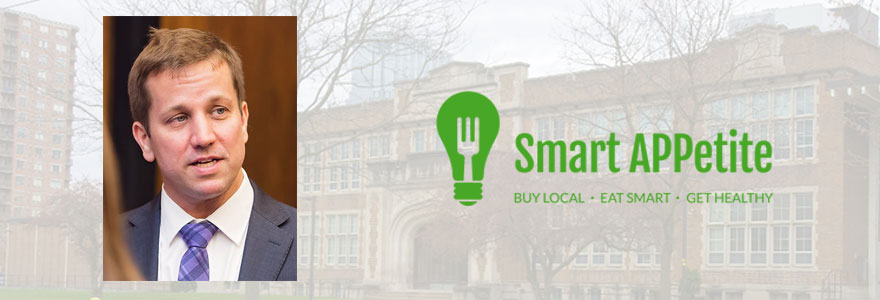News and Updates
Contact
Faculty of Social Science
Social Science Centre
Room 9438
Western University
T. 519-661-2053
F. 519-661-3868
E. social-science@uwo.ca
Encouraging smart appetite in youth
November 21, 2018
How do you change how youth think about food and health?
Jason Gilliland thinks the answer may be in the palm of our hands.
Gilliland, Professor in the Department of Geography, is the Primary Investigator on at CIHR grant to evaluate the use of a smartphone based intervention for improving food literacy and diet among youth. The project will focus on encouraging youth to download and use SmartAPPetite, a smartphone app which provides food and health related tips and information to youth.
While SmartAPPetite is available for the public to download, Gilliland hopes to recruit approximately 4,500 students in up to 18 schools, for the five-year project.
The app is based on behavioural economics, also known as nudge theory. Through the app, users are provided timely tips and information, which have all been designed by registered dietitians, and are from validated sources. Instead of chastising people for negative behaviour, the tips are designed to provide information on positive food or lifestyle choices they can make, ‘nudging’ them to make good decisions.
“There is a lot of interesting work around nudge theory, and good information about behavioural economics and health in general,” said Gilliland. “We want to look at how to respond if people make poor choices, as they may not have the information to make good choices.”
Students will be asked to provide some information about themselves, such as location, age and gender, and the tips will vary depending on this information, and even potentially on what food choices are available in their proximity. During the study, students will be asked to rate the usefulness of the tips. These ratings will be used to determine which tips are most effective for people in different groups, based on location, gender, and even ethnic background.
The study group will also look at if, and how, the effectiveness of the app is changed by the food environment.
Gilliland hopes to see if, through the app, changes can be made to behaviour of youth to improve the overall diet, and through that, adjust the diet to improve overall health.
“We know dietary quality drops around age 14, when teens start to have more influence around what they eat,” said Gilliland. “If we can impact their decisions then, we can have a long lasting impact.”
The project is bringing together a wide variety of experts, including academics with backgrounds in Geography, nutrition, paediatric cardiology, epidemiology, management and organization studies, health promotion, planning and statistics.
“This is an economics, environmental and informational study all at once,” said Gilliland. “The geographic side is the most important, because we want to know if certain aspects are present in the environment, and then how people use the information.”
“We want to give people enough information to work with the environment they live in, to make healthier
decisions,” said Gilliland.
This is the seventh CIHR grant Gilliland has been primary investigator on, many of which have focused on the association of health and the environment.
“I’ve been working on research on the built environment and health for 15 years. I’ve shown the association between the environment and health,” said Gilliland. “I don’t want to keep doing work showing there’s a pattern. I want to look at how to do interventions to improve health.”

